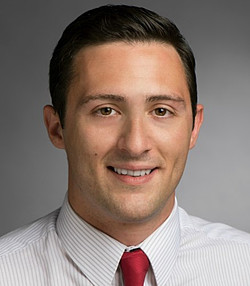Panos Markopoulos
Title
L1-norm Principal Component Analysis of Matrices and Tensors
Abstract
Multi-modal data are commonly stored and processed as tensors (i.e., multi-way arrays). TUCKER decomposition is a cornerstone method of tensor analysis, with a plethora of applications in signal processing, computer vision, wireless communications, biomedical signal processing, and data mining, among other fields. For 2-way tensors (i.e., matrices), TUCKER decomposition simplifies to standard Principal Component Analysis (PCA). Algorithmically, TUCKER decomposition is commonly computed by means of the Higher-Order Singular-Valued Decomposition (HOSVD) and the Higher-Order Orthogonal Iterations (HOOI) algorithms. Due to its L2-norm-based formulation (i.e., L2-residual-error minimization, or L2-projection-variance maximization), TUCKER is known to be sensitive against faulty entries (outliers) within the processed tensor. Recent research has shown that L1-norm-based TUCKER (L1-TUCKER), formulated simply by replacing the L2-norm in TUCKER by the robust L1-norm, attains remarkable resistance against faulty data, while it performs similar to standard TUCKER when the processed data are nominal/clean. In this talk, we present the state-of-the-art in outlier-resistant L1-TUCKER decomposition of tensors.
About the Speaker
https://people.rit.edu/pxmeee/
Dr. Panos P. Markopoulos received the Diploma (5-year program) and M.Sc. degrees, both in Electronic and Computer Engineering, from the Technical University of Crete, in 2010 and 2012, respectively. He received the Ph.D. degree in Electrical Engineering from The State University of New York at Buffalo, Buffalo NY, USA, in 2015. Since 2015, he has been an Assistant Professor with the Department of Electrical and Microelectronic Engineering (EME), Rochester Institute of Technology, Rochester NY, USA, where he directs the Signal Processing for Data Communication and Analysis (SCAN) Research Group and co-directs the Communications Laboratory of the EME Dept. In Summer 2018, he was a Visiting Research Faculty at the U.S. Air Force Research Laboratory (Information Directorate), in Rome NY. His research interests span the areas of signal processing, communications, data analysis, and machine learning. Dr. Markopoulos is a member of the IEEE Communications, IEEE Signal Processing, and IEEE Computer Societies. Since September 2017, he is an Editor of the IEEE Wireless Communication Letters. In 2017 and 2018, he was co-Organizer/co-Chairman of the IEEE International Workshop on Wireless Communications and Networking in Extreme Environments. In 2017, he co-organized the special session on Advances in Processing of Faulty High-Dimensional Data, at IEEE CAMSAP 2017. In 2018, he co-organizes the special session on Signal Processing and Communications for Resilient Autonomous Systems, at IEEE SAM 2018. Dr. Markopoulos is co-organizing and co-chairing the 2018 IEEE GlobalSIP Symposium on Tensor Methods for Signal Processing and Machine Learning. In 2016, he received the Exemplary Reviewer distinction from the IEEE Wireless Communications Letters. In 2013, he received the Best Paper Award in Physical Layer Communications and Signal Processing of the 2013 International Symposium on Wireless Communication Systems.




